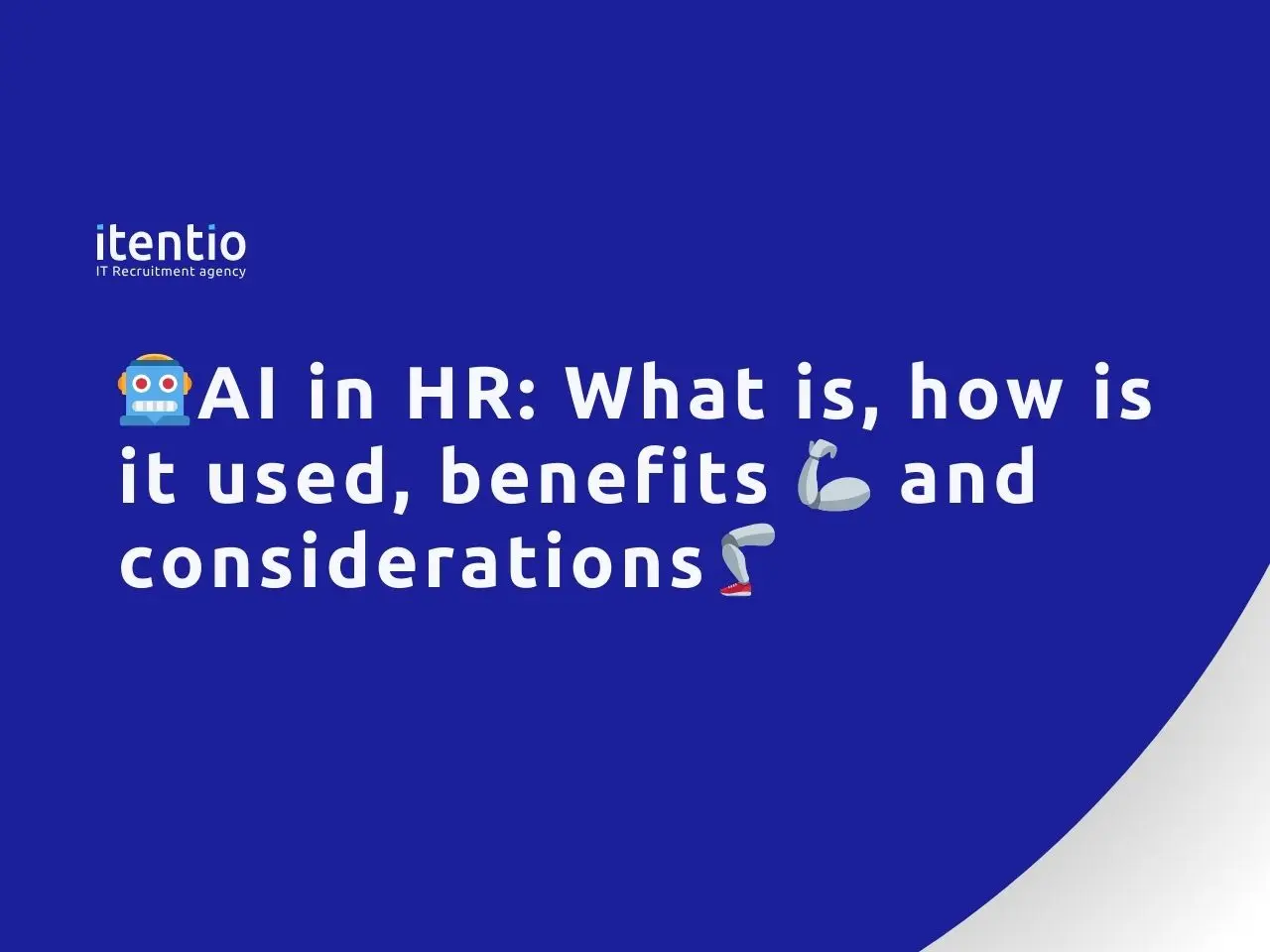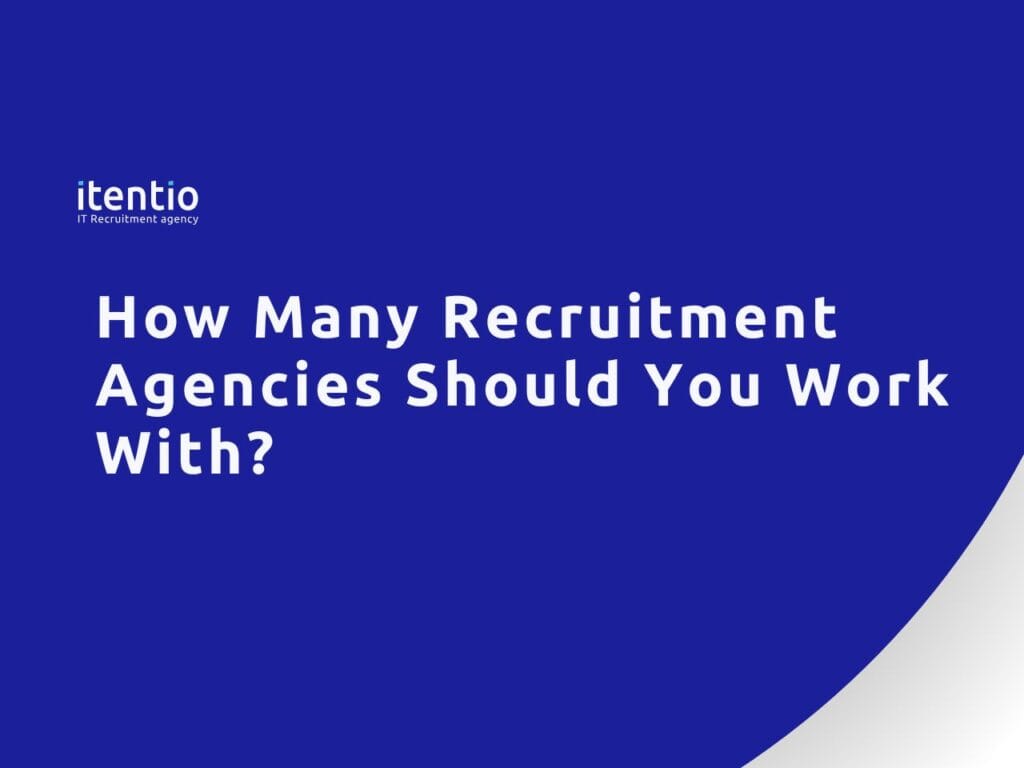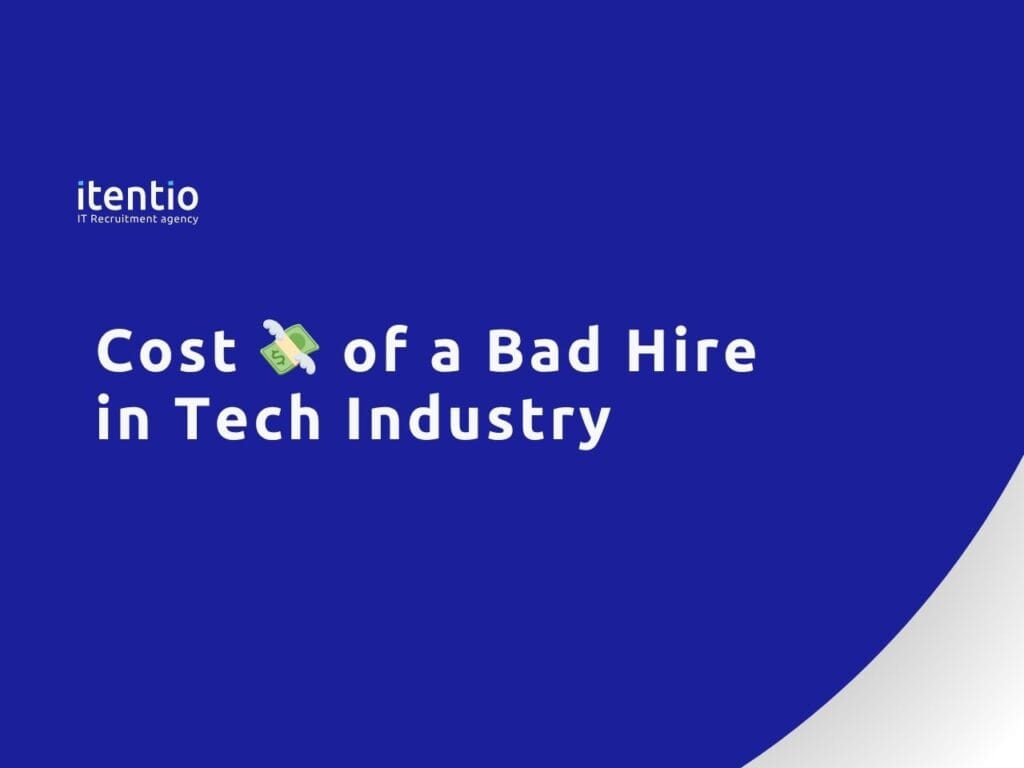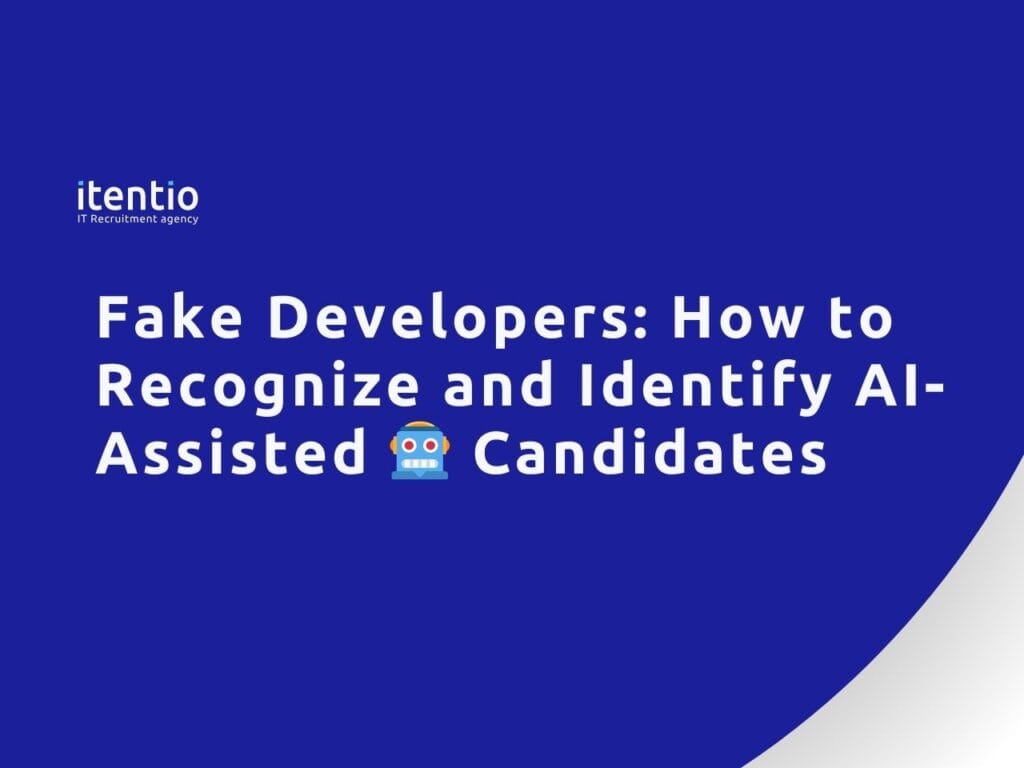Artificial Intelligence (AI) is rapidly changing how businesses operate, and Human Resources (HR) is no exception. In this article, we’ll explore what AI in Human Resources actually means, how it’s being applied across the employee lifecycle, the tangible benefits it offers, the ethical concerns it raises, and what the future might hold. From hiring to retention, we’ll break down how AI is reshaping the workplace, and what HR professionals need to know to stay ahead.
What Is AI in HR?
Artificial Intelligence in Human Resources (HR) refers to the application of machine learning, data analytics, natural language processing, and automation tools to improve and streamline HR functions. It’s practical technology that can and already reshaping how companies attract, manage, and retain talent.
At its core, Artificial Intelligence in Human Resources is about making smarter decisions using data. It enables systems to learn patterns from large volumes of information, like resumes, employee surveys, performance metrics, and to act on that insight with minimal human intervention. AI doesn’t replace HR professionals, but it augments their capabilities, helping them focus on strategic, people-centered work instead of manual and repetitive tasks.
The idea isn’t just to save time or cut costs, although that happens. It’s also about improving accuracy, reducing bias (if used responsibly), and making HR team more proactive. For instance, instead of waiting for high performers to quit, AI can find, estimate and flag early signs of disengagement. Instead of manually screening hundreds of applications, AI can shortlist the most relevant candidates based on stated criteria in minutes.
Artificial Intelligence is being integrated across nearly every part of the HR function, from recruiting and onboarding to employee engagement, performance management, and even exit interviews. The more internal data your systems have, the more predictive and personalized the AI outcome can become.
Artificial Intelligence in HR isn’t only a tech upgrade, but also a shift in how companies understand and interact with their workforce, moving from gut instinct and spreadsheets to real-time insights and intelligent automation.
How AI Can Be Used in HR
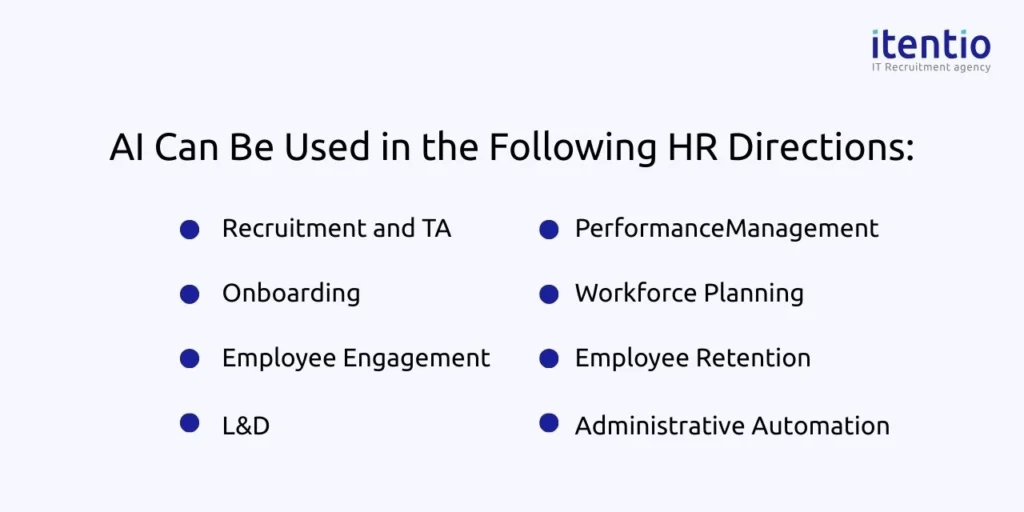
Artificial Intelligence can touch almost every major function within HR, transforming both the back-end systems and the employee experience. Here’s a breakdown of how it’s being used across the employee lifecycle:
1. Recruitment and Talent Acquisition
AI is perhaps most visible in recruiting. Tools like applicant tracking systems (ATS) now come with AI-powered features that can:
- Scan and rank resumes based on job requirements.
- Analyze candidate profiles from platforms like LinkedIn.
- Chat with applicants via bots to answer questions or schedule interviews.
- Predict candidate success based on past hiring data.
This can speed up the recruitment process, and might reduce human error and unconscious bias, but an AI should be trained correctly and most likely won’t do the job perfectly, so there should still be a system of double check by HR team representative.
2. Onboarding
AI can automate repetitive onboarding tasks such as document verification, training assignments, and initial Q&As. Virtual onboarding assistants may guide new hires through their first days, ensuring they get the right information and can answer their questions at the right time.
3. Employee Engagement
Artificial Intelligence tools can monitor employee sentiment through surveys, emails (ethically, with consent), and collaboration tools to gauge morale in real-time. These tools can detect early signs of disengagement, allowing HR to intervene before problems grow.
4. Learning and Development (L&D)
Artificial Intelligence can help personalize trainings by recommending courses based on role, goals, learning style, past behavior, or performance gaps. Instead of one-size-fits-all training, employees get tailored development paths.
5. Performance Management
Artificial Intelligence analyzes performance data to identify patterns and suggest improvements. It can also help eliminate bias in performance reviews by flagging inconsistencies and providing data-driven feedback.
6. Workforce Planning and Analytics
With predictive analytics, AI helps HR managers forecast staffing needs, model attrition rates, and optimize resource allocation. For example, it can predict when a team might be overworked and at risk of burnout.
7. Employee Retention
By analyzing data points such as engagement scores, attendance, and manager feedback, AI can predict who might leave and why. HR can then take preventive actions, whether it’s a conversation, a new role or internal movement, or extra support for employee.
8. Administrative Automation
Artificial Intelligence can automate repetitive tasks like leave requests, payroll processing, or benefits administration. Chatbots can handle routine questions about policies, saving HR hours every week.
Once again, AI in HR isn’t about replacing people, it’s about freeing them from some routine tasks (at least partially) so they can focus more on the parts of HR that require empathy, judgment, and human connection.
Key Benefits of Using AI in Human Resources
AI in HR can become a strategic advantage, when implemented thoughtfully. It can improve decision-making, enhance employee experience, and drive better business outcomes. Here are some key benefits of using AI in Human Resources:
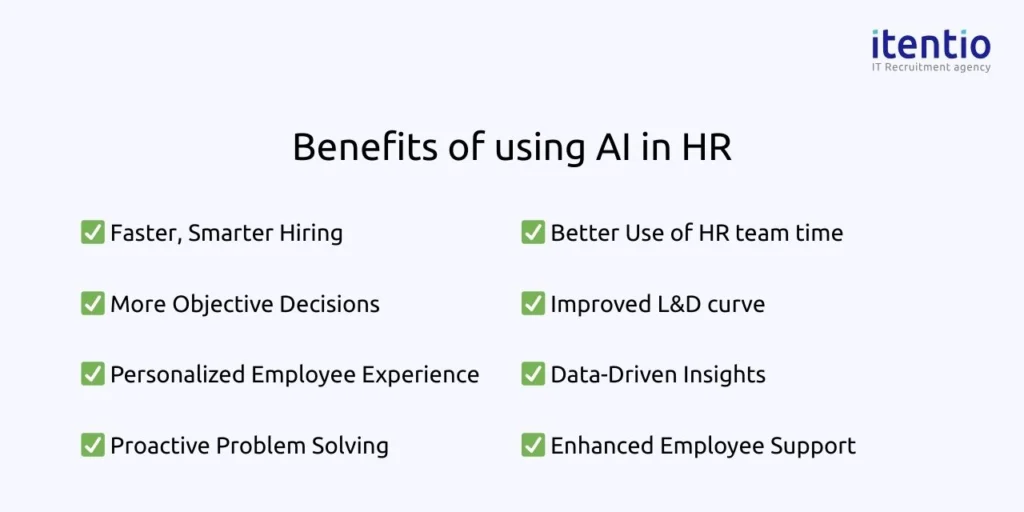
- Faster, Smarter Hiring – AI can reduce time-to-hire by automating screening and scheduling. Instead of spending weeks reviewing resumes, recruiters get ranked shortlists instantly. AI can also match candidates to roles based on skills and potential, assessing their full experience and expertise path, not just keywords, widening the talent pool.
- More Objective Decisions – When designed correctly, AI systems help reduce human bias by focusing on data over personal impressions. For example, it can strip out identifiers like names or photos during initial screening, promoting fairer hiring decisions.
- Personalized Employee Experience – AI enables personalization at scale. For instance, curated custom learning plans, tailored wellness recommendations, employees receive support that’s relevant to their goals and needs. This boosts engagement and retention.
- Proactive Problem Solving – AI excels at pattern recognition. It can spot trends in absenteeism, turnover, or engagement before they become problems. This lets HR take preventive action, for instance, manager coaching, policy changes, or individual support.
- Better Use of HR Resources – By automating administrative tasks, AI frees HR teams to focus on strategy and people. Less time spent on data entry means more time for workforce planning, culture building, and leadership development.
- Improved Learning and Development – AI-powered learning platforms adapt content to each employee’s role, learning style, and progress. That means more effective training, higher completion rates, and stronger upskilling, all aligned with business goals.
- Data-Driven Insights – With AI, HR decisions are grounded in real-time data. Compensation, performance, or career progression, leaders get dashboards and predictions to guide choices with confidence.
- Enhanced Employee Support – AI chatbots provide 24/7 assistance for common HR questions, from vacation policies to benefits enrollment. This reduces wait times and improves employee satisfaction.
As a result, AI enables HR teams to move faster, think deeper, and deliver a more human-centric experience, ironically, by leveraging machines.
Ethical Considerations of Using Artificial Intelligence in HR
Artificial Intelligence in Human Resources can drive powerful results, but it also introduces serious ethical questions. How data is collected, analyzed, and used can impact fairness, privacy, and trust in the workplace. Without guardrails, even well-intentioned AI systems can do harm.
Bias in Algorithms
Artificial Intelligence is only as fair as the data it’s trained on. If historical hiring or performance data includes bias, based on gender, race, age, or any other factors, AI can replicate or even amplify that bias. For example, a resume screener trained on past hires could favor male candidates if most previous hires were men.
Solution: HR team of the company must audit AI systems regularly for bias, ensure diverse training data, and include human oversight in decisions.
Transparency and Explainability
Many AI systems operate as black boxes, making decisions without explaining how or why. This lack of transparency is dangerous in HR, where decisions impact people’s careers and livelihoods.
Solution: Organizations should prioritize “explainable AI”, systems that can clearly justify their decisions. Employees should have the right to understand how AI affects them.
Privacy and Data Protection
AI systems rely on vast amounts of employee data, including emails, behavior, and productivity metrics. Collecting and using this data without clear boundaries can feel invasive or even be illegal under privacy regulations like GDPR.
Solution: HR managers must be transparent about data use, get informed consent, and protect employee data with strong security and compliance practices.
Consent and Autonomy
Just because Artificial Intelligence can analyze employee behavior doesn’t mean it should. Monitoring productivity through keystrokes or webcam usage, for example, crosses ethical lines and damages trust.
Solution: Use AI to support employees, not control them. Always prioritize autonomy, dignity, and psychological safety.
Accountability
When AI makes a mistake, unfairly rejecting a candidate or flagging the wrong person for performance issues, who is responsible?
Solution: Responsibility must always stay with people. AI should assist, not replace, human judgment. HR and leadership teams need clear processes for reviewing and overriding AI decisions.
Job Displacement
While Artificial Intelligence often enhances HR roles, it may also reduce the need for certain tasks, raising concerns about job security.
Solution: Organizations should reskill HR professionals to work alongside AI, not fear it. The goal should be augmentation, not replacement.
Ethics in AI is an ongoing commitment. Companies that embrace AI with transparency, fairness, and empathy will earn trust and build stronger, more resilient workplaces.
The Future of Artificial Intelligence in HR
Artificial Intelligence allows organisations to rethink how they define work, culture, and human potential. As AI matures, its role in HR will expand from support to strategy, helping organizations become more adaptive, inclusive, and personalized.
From Automation to Prediction
Artificial Intelligence is already automating repetitive tasks. Next, it will become predictive. Instead of reacting to resignations, companies will use AI to anticipate such risks months in advance. Instead of generic job descriptions, AI will dynamically suggest roles tailored to evolving skills and business needs.
Hyper-Personalized Work Experiences
Just as Netflix recommends shows, future HR systems will personalize as much as they can, from career paths to wellness plans. Employees will get real-time coaching, nudges for growth opportunities, and customized learning, all informed by AI.
AI-Powered Diversity and Inclusion
If developed ethically, Artificial Intelligence could help identify and remove systemic bias in hiring, promotions, and performance evaluations. By continuously analyzing data, it can flag patterns of inequity and offer actionable insights to promote fairness.
The Rise of Augmented HR Teams
Rather than replacing HR professionals, AI will continue augment them. Routine tasks will be delegated to machines, freeing HR teams to focus on strategic areas like company’s culture, leadership, and employee wellbeing. The human side of HR will matter more, not less.
Ethics as a Competitive Advantage
Organizations that treat Artificial Intelligence ethically, with transparency, fairness, and accountability, will attract better talent. As employees become more aware of how their data is used, companies that prioritize responsible AI will stand out as trusted employers.
Continuous Adaptation
The pace of change in Artificial Intelligence will demand constant learning and adaptation. HR itself will need to evolve, updating policies, upskilling teams, and embracing a mindset of experimentation.
Human + AI = Better Decisions
Ultimately, the future isn’t about Artificial Intelligence vs. humans, it’s about AI with humans. The best outcomes will come from combining data-driven intelligence with empathy, context, and human judgment. HR won’t be less human; it will be more human where it matters most.
Conclusion: AI in HR
AI in HR is no longer a futuristic idea, it’s a present reality with growing influence. When used responsibly, it can transform HR from a reactive function into a proactive force that drives business performance and employee success. The challenge ahead is not just to adopt the tools, but to use them wisely, ethically, and with a clear focus on people.
Do you want to stay ahead in tech recruitment in 2025? Whether you’re exploring new career opportunities or looking for top talent in Poland or Central and Eastern Europe for remote, hybrid, or on-site roles, Itentio IT Recruitment is here to help. Allow us to assist you and connect you with the right professionals to drive your business forward. Secure the future of your tech team – contact us today!
